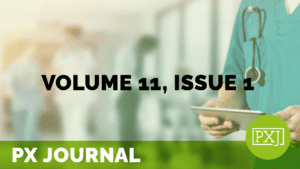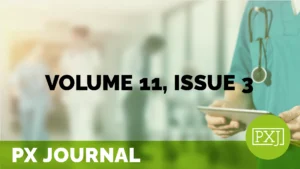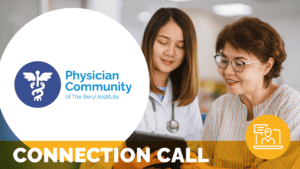Healing Forward: The Patient. The Provider. The Administrator.

In this PX Blog, I will address the patient experience from a patient’s perspective, mine! Having been diagnosed with cancer, I got empowered by taking charge of my diagnosis. Now thriving, I am living with purpose and passion. As an educator, published author, and patient advocate, my mission is to help others through their journey with an illness toward recovery, healing, and beyond. I pay it forward by teaching others how we must be engaged participants as co-creators of our wellness and well-being.
For over a decade, I’ve worked with physicians and clinicians in health systems to develop and plan medical education programs that close the “gaps” and achieve optimal patient outcomes. Collaborating with administrative leadership over the years, I’ve seen how balancing budgets, navigating rising costs, and maintaining fiscal responsibility are essential to my departmental and hospital viability. This first-hand experience and becoming a patient in the health system gave me a unique perspective and ability to understand both sides. Having a holistic approach and working together, we can create and achieve the optimal patient experience.
In healthcare, we often refer to the Triple Aim, now expanded to the Quadruple Aim, enhancing the patient experience, improving population health, and reducing costs with the additional goal of improving the work life of healthcare providers. This fourth aim could not be more relevant as exacerbated by the global pandemic; our health systems and providers were pushed to the brink of dealing with clinician burnout, The Great Resignation, and continued workforce shortages. Along with an aging population driving increasing demand, people living longer with age-related disabilities and chronic lifestyle diseases are putting further strain on our already fragile healthcare systems, providers, and us!
Living Beyond the Walls of Hospitals
In the preface of my book Just Diagnosed: Breast Cancer, I briefly discuss healthcare in the United States. It blows my mind that our outcomes repeatedly underperform while the United States spends more on healthcare than other high-income countries. Centers for Disease Control (CDC) reports that the top two leading causes of death in the United States are heart disease and cancer, with over 1.3 million affected.
Diabetes is on an alarming rise; obesity is a growing epidemic, and more than one in five adults is challenged with mental illness. So, what responsibility may companies, employers, our federal government, or states have, and more importantly, what is our responsibility as healthcare consumers to ensure we are best informed and take better care of ourselves?
The Seven 7 Steps To Own and Take Charge of Your Diagnosis
The entrance of Big Tech in healthcare, artificial intelligence (AI), quantum computing, patient connectivity, Internet of Things (IoT), electronic health records (EHR), and other technologies allowing greater transparency and accessibility to information is empowering consumers now more than ever to educate ourselves and gain knowledge and, in some cases, more affordable access to medical care.
It was journeying through breast cancer that I crafted the seven steps I initially took, and you can, too, to own your diagnosis. We have a choice to take a positive attitude and face our adversity with fearlessness head-on. I hope these will help you or your friends, family members, colleagues, or caregivers become empowered. My good friend, who battled kidney cancer, shared with me that these steps applied to his diagnosis and can apply to help navigate any diagnosis. Here are my seven steps to own and take charge of your diagnosis:
The 7 Steps
- Listen to your body.
- Go to the doctor.
- Make sure you take notes.
- Bring someone with you.
- Reach out for help.
- Get copies of your medical records.
- Research. Research. Research.
Once we are done being patients on the road to healing, we must shift into the narrative to be co-creators of our health and outcomes. Focusing on our environment, diet, and exercise to help us to heal forward to live our best lives ever! Together taking ownership of our health and working harmoniously with our providers toward patient-centered care, shared decision-making, and empowerment.
About the Author
Arlene M. Karole, FACHE, CHCP, CMP, MSA, is board certified in healthcare management as a Fellow of the American College of Health care Executives (FACHE), a Certified Health care Professional (CHCP) and earned her Master’s degree in health services administration. As a healthcare executive, educator, author of Just Diagnosed: Breast Cancer, and founder of Illumination Associates, educating patients and caregivers on how to take charge of their health. She is an inspired, outspoken leader and patient advocate. Karole serves and is active on the boards of numerous healthcare organizations, has been featured in multiple national media publications, and is a columnist for a breast cancer magazine.
Related content
-
 Patient Family & Community Engagement
Patient Family & Community EngagementLived Experiences of Cancer Patients Who Chose to Stop Receiving Treatment
The study aimed to understand the lived experience of cancer patients who abandon treatment. Four semi-structured interviews were conducted, and the data was examined using interpretative phenomenological analysis. It resulted in four superordinate themes: (i) ‘Lack of knowledge about cancer’ dealt with patients’ knowledge and perceptions about their cancer. (ii) ‘Hopelessness with oneself and God.’
Learn more -
 Patient Family & Community Engagement
Patient Family & Community EngagementTrust Remains the Foundation of my Practice
Navigating healthcare while managing the complexities of disease, especially in elderly individuals, is challenging for both patients and their families. Physicians play a crucial role as pathfinders in this journey. However, physicians often experience burnout when dealing with patients and families facing complex illnesses. This narrative highlights the characteristics that enable physicians to effectively negotiate
Learn more -
 Patient Family & Community Engagement
Patient Family & Community EngagementThe Three W’s of Caring Communication: Who/What/Why
In this mini-webinar, Dr. Liza DiLeo Thomas, Medical Director of Patient and Provider Advocacy, shares Ochsner Health’s “Caring Communication” model for providers. Learn how physicians can create trusting relationships with patients and families by following the three Ws.
Learn more
